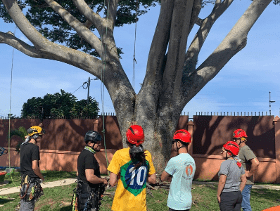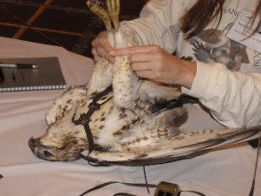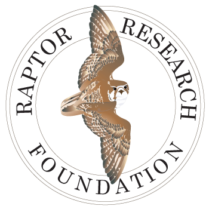Workshops
Workshops
The RRF will be hosting a full day of workshops on October 14th and a half-day of workshops on October 15th.
Workshops are available to all conference participants with discounted rates available for students, Early Career Raptor Researchers (<3 years post-graduation) that are current members of RRF, as well as special-country conference participants.
Workshops will be taught by leading experts and will focus on hands-on skill-building that is typically not available in traditional undergraduate or graduate classes. Courses lengths vary from 4-5 hours and will be scheduled to allow participants to select from a variety of courses throughout the day. Class sizes will be up to 20 students per class to provide an intimate and interactive learning environment. All raptor carcasses are used with federal and state permissions.
Please note some workshops will occur before the day before the scientific program commences and will require that participants arrive at the conference venue by 8:00 am on Tuesday, October 14.
A fee will be charged for each workshop to help defray room rental and supplies.
Note: We are offering reduced rates for conference participants from all countries except: USA, Canada, Israel, Japan, Australia, New Zealand, Iceland, Norway, Sweden, Finland, Denmark, Germany, The Netherlands, Belgium, Luxembourg, France, United Kingdom, Ireland, Switzerland, Austria, Italy, Spain, and Portugal
Costa Rican Raptors Identification Workshop
Instructors: David Araya-H. (Talamanca Hawkwatch), Kenneth Acuña Vargas (Lapa Verde Hawkwatch)
Participant cap: 15
Time/duration: 0900 – 1200; 3 hours each
Date: 2 sessions – October 14 (in English) and October 15 (en Español)
Location: Conference hotel
Cost: $50 regular/$15 ECRR/Student/Special Country
Description: Join us for an in-depth Costa Rican Raptors Identification Workshop, where you'll learn to confidently identify the country's diurnal and nocturnal birds of prey. This workshop will cover essential ID keys, helping you distinguish species based on size, shape, plumage, and flight patterns. We'll also explore commonly confused species, highlighting key differences to avoid misidentifications. Participants will gain insights into raptor behavior, distribution, and vocalizations, enhancing their ability to recognize species in the field. The workshop includes interactive ID activities, such as photo and sound quizzes, field exercises, and case studies, ensuring a dynamic and hands-on learning experience. Whether you're a beginner or an experienced birder, this workshop will deepen your knowledge and appreciation of Costa Rica’s incredible raptors!

Introduction to Technical Tree Climbing for Research
Instructors: Jeyson Arce, Juan Carlos Cespedes, John Traverso, and Eric Folmer
Participant cap: 20
Time/duration: 0900 – 1700; 8 hours
Date: Tuesday, October 14th
Location: Hotel Robledal
Cost: $100 regular/$30 ECRR/Student/Special Country
Description: This class is a hands-on introduction to technical tree climbing. You will learn and practice safe ascending, descending, knot tying, rope setting, and basic tree assessment. All equipment will be provided. The four instructors are very experienced climbers and climbing teachers. Lunch will be provided.


Harnessing Raptors with Transmitters
Instructors: Tricia Miller (Conservation Science Global, Inc.), Vincent Slabe (The Peregrine Fund/Conservation Science Global, Inc.), Michael Lanzone (Cellular Tracking Technologies)
Participant cap: 25
Time/duration: 0800 – 1200; 4 hours
Date: Wednesday, October 15th
Location: Conference Hotel
Cost: $50 regular/$15 ECRR/Student/Special Country
This class will cover the process of attaching transmitters (either VHF, satellite, or GSM) to raptors, from initial thoughts of the bird’s welfare to specifics of making backpack harnesses and attaching telemetry units to birds. We will discuss and demonstrate several different options and methods for making harnesses, different attachment techniques (e.g., tail mount, patagial), and types of transmitters. Most of the class will be hands-on, using a backpack harness to attach a transmitter to carcasses of different-sized raptors.

Physical Exam and Basic Disease Sampling of Raptors
Instructors: Katie McInnis DVM, CWR (Cascades Raptor Center) and Kit Lacy
Participant cap: 20
Time/duration: 0800 – 1200; 4 hours
Date: Wednesday, October 15th
Location: Conference Hotel
Cost: $50 regular/$15 ECRR/Student/Special Country
Safely assessing birds and getting samples from them in a low stress manner, are skills that are not always easy to learn in the field. In this workshop we will review safe, low stress handling techniques and various sampling procedures. Attendees will have a lab with cadavers to practice selected procedures on including: Physical exam, Injections, Choanal swab, Crop swab, and Gavage. We will also review Venipuncture and Fecal sampling, as well as common parasites seen in raptors.
